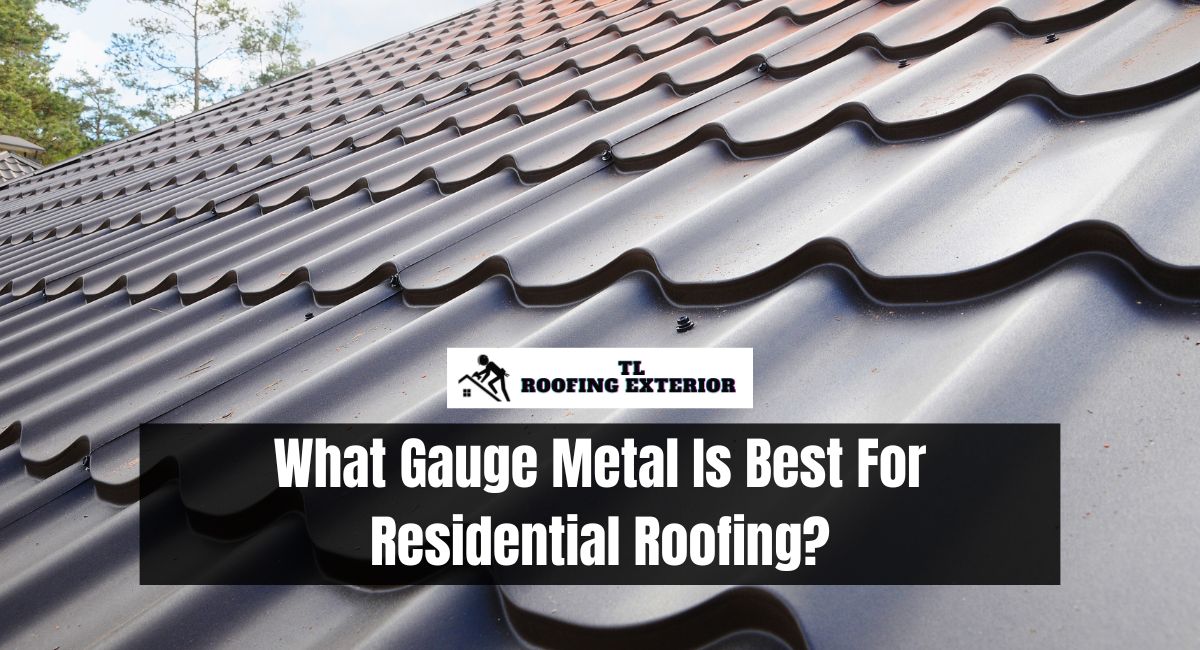Metal is an increasingly popular option for residential roofing due to its durability, energy efficiency, and aesthetic versatility. The gauge or thickness of the metal, however, is a crucial factor that homeowners frequently disregard.
The gauge can substantially affect the performance, durability, and cost of the roof. So, what gauge metal is best for residential roofing?
In this article, we’ll examine the available gauge options, discuss their pros and cons, and offer advice to help you make an informed decision for your property.
What Gauge Metal Is Best For Residential Roofing?
The gauge of metal roofing refers to the thickness of the metal, with a lower gauge indicating a thicker metal. The best gauge for residential roofing can vary depending on several factors, including the type of metal, the design of the roof, local building codes, and climate conditions. Here are some general guidelines:
Common Gauges for Residential Metal Roofing
- 29-Gauge: This is the narrowest gauge typically used for residential applications. It is more affordable but less durable than sturdier alternatives. It is frequently utilized for corrugated and ribbed roofing materials.
- 26-Gauge: This option strikes a decent balance between affordability and durability. It is frequently used for standing seam roofs and is suitable for the vast majority of residential applications.
- 24-Gauge: 24-Gauge is a bulkier option that is utilized less frequently in residential settings but is more durable. It’s more commonly used in commercial or industrial applications but can be used in homes for optimal longevity.
Factors to Consider
- Climate: In regions with extreme weather conditions, such as heavy snowfall or strong winds, a thicker gauge, such as 24 or 26, maybe more durable.
- Roof Design: Complex roof designs with numerous valleys, fissures, or penetrations may require a heavier gauge to withstand the added stresses.
- Cost: In general, thicker gauges are more expensive, both for the material and for the installation, as they are bulkier and more difficult to work with.
- Local Building Codes: Local building codes may have specific requirements for metal roofing dimensions.
- Type of Metal: The optimal gauge can vary based on the type of metal used. At the same gauge, steel and aluminum may not possess the same strength.
- Manufacturer Recommendations: Some manufacturers offer warranties that are dependent on using a certain gauge, so it’s a good idea to check any warranty conditions when choosing.
- Aesthetic Preferences: Thicker gauges may offer a distinct aesthetic quality, with tighter seams and a more “substantial” appearance.
- Energy Efficiency: Thicker metal can also provide greater energy efficiency because it is less likely to deform or bend, resulting in a more effective seal against the elements.
- Sound: Thicker gauges may provide improved soundproofing against precipitation and debris.
So The Best One Is:
For the majority of residential roofing applications, 26-gauge metal is typically regarded as the finest option. It provides a decent balance of durability and affordability, making it suitable for a variety of climates and conditions.
This gauge is thick enough to resist denting and other forms of damage while also being lightweight and simpler to install than options with a thicker gauge. Always consult a roofing expert to determine the optimal material for your specific requirements and local climate.
What Is Better 24 Or 26 Gauge Metal Roof?
The decision between 24 and 26-gauge metal roofing depends on your particular requirements. A 24-gauge metal roof is sturdier and, consequently, more durable, making it a superior choice for harsh climates or commercial applications.
Nonetheless, it is more costly and heavier, which may necessitate additional structural support. In contrast, the 26-gauge is lighter, simpler to install, and less expensive, making it a popular option for residential construction projects. Both are durable, but your decision should take into account the local climate, the building’s purpose, and your budget.
Conclusion
Choosing the appropriate gauge for your metal roof is a crucial decision that impacts its durability, performance, and price. Thicker gauges, such as 22- or 24-gauge, offer greater durability and damage resistance but come at a higher price.
Conversely, thinner gauges, such as 26- or 29-gauge, are less expensive but may not offer the same level of durability, particularly in severe weather conditions.
Your decision should be influenced by variables such as the local climate, the slope of the roof, and your budget.
Read More: What Is The Best Insulation For A Metal Building?
